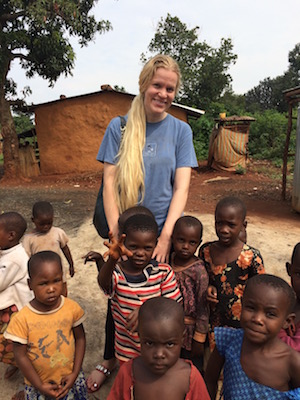FAU Instructor on Mission to Bring Hope to Ugandan Village
When Elizabeth Gillespie first traveled to Uganda in the summer of 2013, she witnessed things that would trouble most people. Still, she goes back. "You physically leave, but a part of you never really does.”

In a country where 90 percent of the population lives on $2 a day and more than 2.5 million children are orphaned the need for help is overwhelming.
When first traveled to Uganda in the summer of 2013, she witnessed things that would trouble most people.
Shortly after arriving in a local village outside the town of Jinja near the mouth of the Nile River, Gillespie saw young children, many of them orphaned, standing in long lines outside a dental clinic that had been set up in a local hotel. Dental care is hard to come by in small villages like this – there’s one dentist for every 185,000 people in Uganda – and most of the children arrived with several rotten teeth that had to be removed.
With Novocain in short supply, the children walked out with cheeks puffed out from swollen gums, tears rolling down their faces. Gillespie was tasked with distributing medicine and trying to comfort the children.
“I remember these kids coming out of the room and their faces are swollen up like chipmunks,” said Gillespie, an instructor who teaches business communication in Florida Atlantic University’s College of Business. “They had all these tears coming out of their eyes, but there’s not really any sound coming out because their mouths were so swollen that they really couldn’t fully cry. And they would just sit there and I would hug them and they would just sink into me. It’s just a very sad image that will stick with you.”
Gillespie was part of a mission team with an organization called . She returned to the village last summer and will make her third trip there in July. She works with women in the village with a women’s ministry called , which provides micro-financing of $35 per month to the women for one year to help them build a sustainable business and a relatively steady income.
Along with working with orphans and feeding the hungry, the organization also has built homes for some of the women, who previously lived in abominable conditions, she said. Medical teams make periodic visits to the villages to provide free medical and dental services, while also helping to train aspiring doctors and dentists in Uganda to treat villagers with medical conditions more effectively. During these visits, a pharmacy is set up to distribute medicine, and eyeglasses are also given out to villagers.
 “For me seeing the change in individuals has been worth it for me to go back a third time this year,” said Gillespie. “It’s like you physically leave, but a part of you never really does.”
“For me seeing the change in individuals has been worth it for me to go back a third time this year,” said Gillespie. “It’s like you physically leave, but a part of you never really does.”
In a country where 90 percent of the population lives on $2 a day and more than 2.5 million children are orphaned the need for help is overwhelming. Gillespie and her fellow volunteers work with women who are making handmade crafts or selling very basic items such as rice, flour, oil and beans. Items such as meat and dairy are luxury items in this area of the country where almost no one has a refrigerator. Life expectancy in Uganda is 54 years for men, 55 for women. Â
In spite of the hardships the villagers face, they possess an almost indefatigable spirit, she said. Last year, more than 100 women attended an entrepreneurial workshop where Gillespie delivered a presentation on professionalism. Much to her surprise, organizers later told her that she had inspired countless several women and was asked to speak again this summer.
In Skype calls over the past year with the man who runs the local children’s home, Gillespie has watched with delight as the children jump and push at each other to get in front of the phone and catch a glimpse of her. She’s excited to see the same children again this summer to teach them English and arithmetic skills. With women in the village working day and night to just help their families survive, the children are also often in need of nurturing, which she’s glad to give them.
Gillespie, who holds a bachelor’s and master’s degree from FAU and is working toward her Ph.D., also looks forward to seeing the progress the women have made in the past year. One woman, Flavia, a graduate from God Is Grace, makes jewelry, purses and other handicrafts from simple materials such as paper. Flavia has sustained her business for several years, and though she could focus on her own success, she has instead chosen to stay and help other women make their own crafts that they can sell.
Another graduate, Caroline, is now a full-time employee with the organization, and she distributes each woman’s monthly income and reports on their progress. Like Flavia, she has been an invaluable resource for helping as many women as possible.
Seeing the women overcome great obstacles to succeed and maintain a positive attitude despite the despair and poverty around them gives Gillespie hope.
“That for me is very much what I try to do here teaching at FAU,” she said. “It’s helping someone realize the following: I have this potential in me, something worthwhile that I can actually use to help other people.”
-FAU-
Tags: faculty and staff | business | ŕŁŕŁÖ±˛ĄĐă